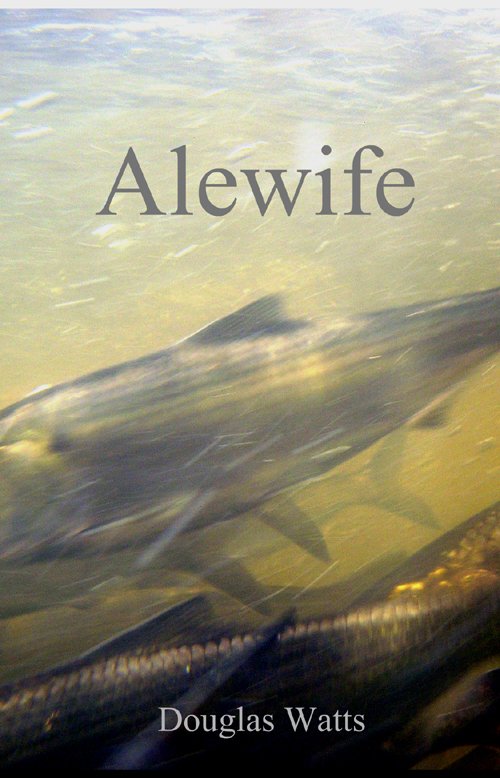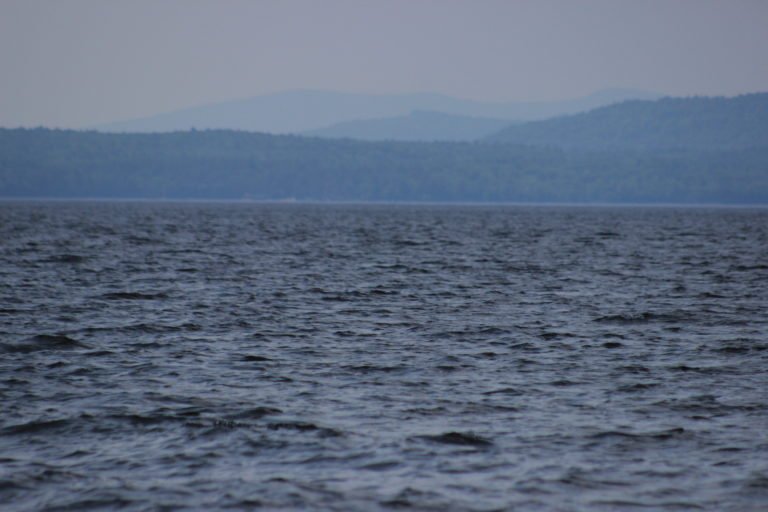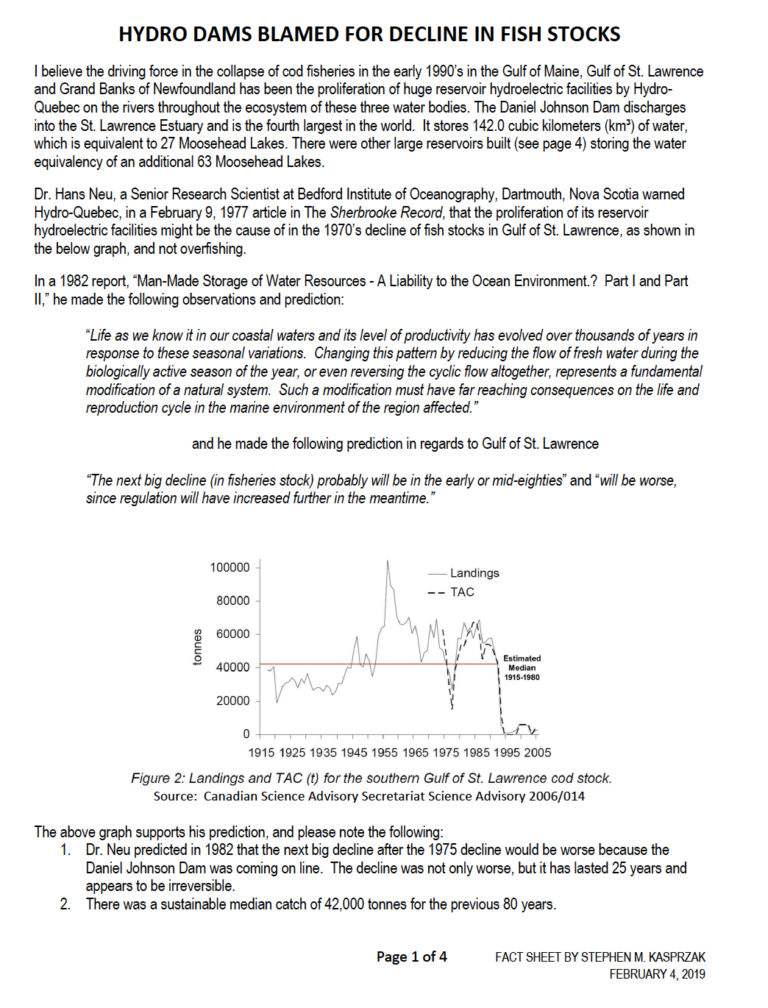Restoring sea run fish to the entire Presumpscot River is guaranteed and appropriate under the Clean Water Act (CWA), but if history repeats itself, the Westbrook Industrial Powers will again derail the potential of a world class fishery for the citizens of towns bordering Sebago and Long Lake waters all the way to Bridgton and Harrison. The Friends of Sebago Lake is standing against the fishery killing ”Sacarappa Agreement”(SA) which is a blatant precedent setting violation of the Clean Water Act.
Historical Background
In 1776, Pondicherry, now known as Bridgton, was one of the Sebago Lake’s region towns mentioned in a petition to the Massachusetts court protesting the blockage of salmon, shad, and alewives by dams on the Presumpscot River. The petition states the importance of these fishes to the local food supply.
By the 1800’s the Presumpscot River mill owners regained a tightening grip over their politicians in government and again, blocked without consequence to themselves, passage of salmon and other sea run fish on the Presumpscot. A similar fate befell the rest of Maine’s largest rivers. By the 1870’s the near shore coastal fishery was collapsing and the Gulf of Maine fish stocks were depleted. As a result, Federal and State governments realizing the resulting economic ruin of the coastal fisheries, required dam owners to build fish passage. In less than a decade by the early 1880’s, sea run anadromous fish returned to Sebago and Long Lake. Other Maine rivers were restored also. Fishermen came by the trainloads to Maine. Summer hotels and boarding houses dotted the shorelines and hillsides. Inland steamer ships and carriages transported tourists from the train stations to Maine lakes. The coastal fishery became vibrant again. It was the age of the 10, 20 and 30 pound salmon in the Sebago Lake Region. Fish commissioners wrote how the numbers and sizes of spawning salmon in the Crooked River were remarkable and for a stream its size they had never seen anything like it in the whole country.
But, again by the early 1900’s the mill interests in Westbrook blocked fish passage. The Presumpscot had become a private sewer for the Industrial Powers through the 1900’s but the Clean Water Act loosened their power. In 2002 a unanimous United States Supreme Court decision against the South African Pulp and Paper Industries (SAPPI) ruled that fish passage was required and appropriate on Presumpscot River dams. The guts of this decision was that not only must water quality be sufficient for native fish to live in but the fish too must be present. Dams were considered dischargers because they do change the quality of water flowing through them and that of any waters impounded by them.
Again, restoration of this great fishery all the way to Bridgton and Harrison and rivers, streams and lakes beyond could proceed. Restoration could easily become reality in fifteen years but SAPPI has submitted their plan which will derail the restoration of the entire Presumpscot River Watershed. The town of Westbrook will gain some recreational advantages but towns bordering the lakes and streams above the lower Presumpscot River all the way to Waterford and Oxford County are left with nothing. Even Westbrook would be left with a much reduced sea run fishery in the future.
Friends of Sebago Lake (FOSL) and Friends of Merrymeeting Bay (FOMB) support sea run anadromous fish restoration of the entire Presumpscot River-Sebago Lake Watershed because:
1. Sea run or diadromous fish restoration to the Sebago Lake watershed would greatly enhance the recreational economic value of these water resources.
2. Restoration will improve the quality of life for people and wild species.
3. Restoration will improve and protect water quality in the entire
Presumpscot Sebago lake watershed.
4. River restoration will help restore the coastal fisheries of the Gulf of
Maine.
5. Full restoration preserves the integrity of the Clean Water Act and
complies with original legislative intent.
Why FOSL opposes the Sacarappa Agreement (SA):
1. The SA will eliminate fish passage as stipulated in the 2003 Federal Energy Regulatory Commission (FERC) licenses for the Presumpscot River called Gambo and Dundee dams.
2. The SA prevents sea run fish restoration of the Sebago Lake Watershed during the present FERC license plus ten additional years.
3. The SA eliminates guarantees of fish passage after the SA extended license expires in 2053 for Gambo and Dundee dams.
4. This SA agreement and changes to the FERC licenses for the Presumpscot River dams violates tenets of the Clean Water Act. If private parties and public agencies working together in secret without public scrutiny or citizen access to information are permitted to make major revisions to FERC dam licenses, no river or inland waters in any state are safe from the wants of special interests that will alter the amounts and timing of seasonal water flows and continue the degradation and destruction of natural ecosystems.
5. New “no stocking” provisions in the SA will further delay passage at
Mallison and Little Falls dams.
What is the Sacarappa Agreement (SA)?
The parties of this private agreement are SAPPI of Westbrook which owns the five lower river dams, Friends of the Presumpscot River, Conservation Law Foundation, the City of Westbrook, US Fish and Wildlife, and Maine Department of Marine Resources. On December 28, 2016 the SAPPI Corporation filed with the Federal Energy Regulatory Commission a request for an amendment to extend again the time frame for completed fish passage and river restoration at Sacarappa Dam in Westbrook. This private agreement states that fish passage at Gambo and Dundee dams upriver in Windham are “not required or appropriate”. We, the Friends of Sebago Lake (and FOMB), have filed an appeal with the Maine Board of Environmental Protection to counter this private agreement that threatens the very tenets of the Clean Water Act as to habitat restoration and restoring historical ecosystems.
A great tragedy was brought upon Maine when the Presumpscot River was dammed without fish passage. The salmon, shad, alewives and other sea run species are prevented from accessing their spawning habitat of the inland lakes including Sebago Lake that empty into the Presumpscot River. These fish were vital to the local citizenry and were crucial for maintaining the food base for a vibrant coastal fishery. In past centuries, fish passage, for a few decades at a time, was maintained on the dams when citizens moved the government to require mill owners to construct fish passage. Unfortunately, the lobby of industrial powers won over the legislature to allow non passable dams for fish and turning rivers into their private sewers. The results from past periods of successfully enforced fish passage especially in the late 1800’s are legendary as newspaper articles and the Fish Commissioners annual reports of that time will attest. In an 8 year period from the 1870’s to the early 1880’s working fishways were built on the seven existing Presumpscot River dam .
Presently, the Clean Water Act requires fish passage on the dams of the Presumpscot River when these migrating fish become present at the base of these non passable impoundments. This is why fish passage must be provided by the SAPPI corporation at the Sacarappa dam in Westbrook. A private Sacarappa Agreement (SA) has been made with SAPPI and other entities that delays passage at this dam and its adjacent two upstream dams at Little Falls and Mallison. But most importantly, it eliminates fish passage at Gambo and Dundee dams during the duration of the license of these two dams. Also, the SA mandates an additional ten year extension of the Gambo dam license. Fish Passage cannot be considered until 2053. Nothing in the agreement guarantees fish passage would even be considered at that distant time. Vast potential areas of fish spawning and living habitat of the upper Presumpscot River, Sebago Lake and its watershed will be cut off if this agreement is approved by the Maine Board of Environmental Protection (MBEP) and the FERC . This precedent setting Sacarappa agreement states fish passage at Gambo Dam is “not required or appropriate.” In 2008 the US Supreme Court decided unanimously in State of Maine vs SAPPI that fish passage was required on Presumpscot river dams and on all dams where these sea run fish historically migrated.
This agreement if it is approved by FERC will ruin the gains made by
this most important Clean Water Act court case. All river restoration in New England would be at risk if this Sacarappa Agreement becomes law.
The restoration of the sea run fish migration in the Presumpscot will translate to great gains in the economy of the region and coastal waters and quality of all life. This is why the Friends of Sebago Lake have filed an appeal to MBEP and a Motion to Intervene to FERC opposing the Sacarappa Agreement (SA). FOSL believes that laws in place must be enforced. Fish passage at Sacarappa must occur now. If Gambo and Dundee Dam’s no fish passage clause, the no stocking provision for young alewives, and and passage delays for Little Falls and Mallison dams are all removed from the SA, it would be reasonable for SAPPI to have two extra years to build fish passages and engineer water flow over Sacarappa Falls conducive to kayaking. SAPPI already has been granted a 2 year extension.
The SA includes a sentence that this agreement establishes no precedents as to State Water Quality Certification but for the Clean Water Act (CWA), it is a precedent. The approval of this SA will stand as the first time the CWA is overturned by private interests at the expense of the greater good of Maine citizens. We should be worried. The SA is complicated and lengthy. It is doubtful some individuals who signed the agreement and members of organizations supporting it were even aware of the provisions eliminating existing fish passage and future guarantees of passage.
FOSL’s appeal to the MBEP in opposition to the Sacarappa Agreement is now being strongly fought by a powerful foreign corporation, South African Pulp and Paper Industries (SAPPI) and the State Attorney General’s office on behalf of the Maine Dept. of Marine Resource who like their predecessors for the past one hundred and fifteen years have accommodated the dam owners. In their filings to the Federal Energy Regulatory Commission, SAPPI argues Friends of Sebago Lake (FOSL) and Friends of Merrymeeting Bay (FOMB) whose members are Maine or United States citizens have no standing or right to intervene before FERC in this proceeding which affects fish passage in the Presumpscot River watershed. If FOSL and FOMB succeed in requiring the present dam licenses be honored and adhered to, teenagers of the present Presumpscot River, Sebago Lake-Long Lake Region and Casco Bay will be able to see and experience with their young children what their ancestors enjoyed and appreciated as one of the finest fisheries in the world.
Meredith Wheeler
President, Friends of Sebago Lake
email: friendsofsebago@yahoo.com tel: 207-935-2994



